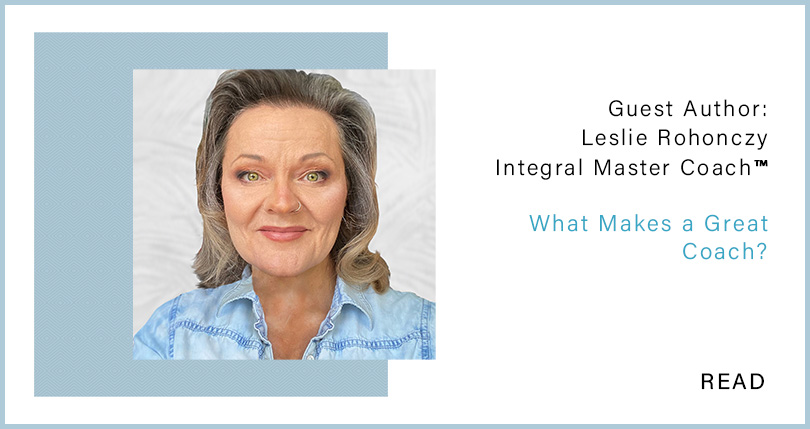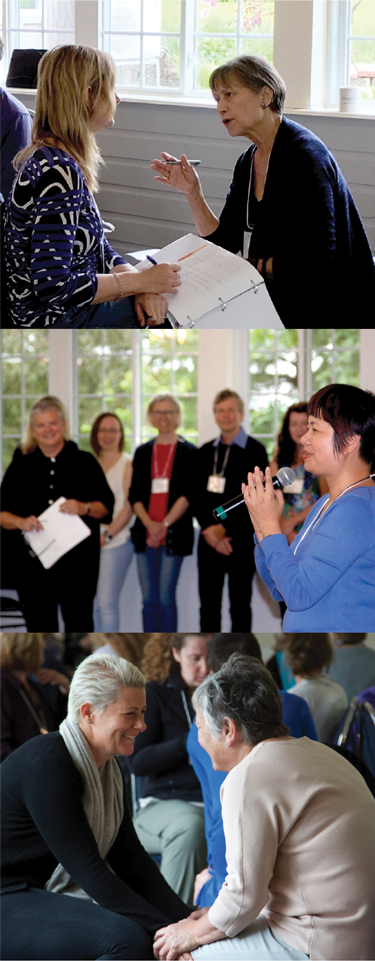

What Makes a Great Coach?

Leslie Rohonczy is a certified Integral Master Coach™ specializing in executive coaching, leadership development, and high-performance teams. Leslie is also a talented singer/songwriter, recording artist, and vocal & performance coach with seven original albums of coaching-inspired music and lyrics that are featured in Leslie’s first book, ‘COACHING LIFE: Navigating Life’s Most Common Coaching Topics’ (2023).
o you have what it takes to be a great coach? Granted, there are people who are naturally talented at helping others work through their problems, but many of the necessary coaching competencies that create transformational and lasting change in others must be learned and practiced. Whether born or bred, there are some common attributes I’ve noticed in great coaches.
They have also been on the other side of the process, as coachees (and still are, from time to time). All the best coaches I know engage in quality coaching for their own ‘dark nights of the soul’ and have experienced first-hand how this transformational work brings profound relief and transformation as a result. They have developed high emotional and behavioral intelligence through this deep work, and their high self-awareness makes them intimately familiar with their own wiring, triggers, blind spots, strengths, weaknesses, and mitigants. Following their own powerful journey, they continue to embrace coaching as an ongoing personal development practice for life. Their high self-awareness means they know who they are, and they bring their full, authentic selves to their coaching relationships, and personal and professional lives. They are brave at naming what they see and feel; they model authenticity and make no apologies for flexing their significant emotional intelligence on behalf of their clients. They show up in real and vulnerable ways even when it’s hard and uncomfortable.
Great coaches are also relentlessly empathetic and trust their intuition to guide program design and coaching conversations. This empathy allows them to understand what their clients feel. They are able to get out of their own experience and see the world as their clients see it. They acknowledge the struggle and honor the hard work their clients are doing to grow new muscles. They never judge their clients’ topics, reactions, or resistance, because they understand it’s all part of the deep journey their clients are on. They embrace guiding their clients to find the answers within themselves and avoid advice-giving – knowing that helping clients arrive at their own a-ha and insights is an infinitely better option to sustain real growth and change.
Great coaches embrace discomfort. They want to alleviate suffering, but NOT discomfort. One of the most difficult things to learn when becoming a coach is how to work with discomfort – our clients’, and our own. But discomfort is what enables growth. If we pull our punches, or shy away from disturbing our client’s space, we are not in service of their best interests, and certainly not doing what they’re paying us to do. Great coaches know that discomfort is an indicator that development is happening. Avoiding it robs a client of the victorious feeling of crawling through their own muck, climbing out the other side, raising their arms in victory and saying, ‘YEAH! I did it!” If we avoid creating discomfort in our clients, we aren’t delivering authentic and powerful coaching.
Great coaches inspire trust and build authentic relationships because they have uncompromising standards for confidentiality, authenticity, and purpose. They show up as judgment-free zones, meet their clients where they are, and in a way that allows the client to relax and feel seen, heard, and safe to be vulnerable. They are willing to experiment with innovative practices in collaboration with their clients, continuously checking in so they can effectively guide a client to push their edges, without pushing them beyond their limits.
Every coach I’ve ever spoken to has shared some version of how much they love the ‘buzz’ that happens when a client has a breakthrough ‘a-ha’. It usually happens in the moment right after a powerful question has been offered, and right before the client can articulate their new insight. Often it starts with wide eyes, and a quick inhale, when a light goes on for them in that instant. There’s really nothing quite like this moment between a coach and coachee, and it’s one of my favorite parts of coaching. Whether in person or virtually connected to their client, we can feel the palpable shifts in energy in these beautiful moments.
One of the most important skills a coach can develop is listening with the intention to understand the individual at a deeper level. When coaches are learning, they practice on each other in peer coaching circles, and what often shows up is how busy they are trying to think up great questions, instead of being fully present and deeply listening to their client. Meanwhile, the client has changed lanes four times as they barrel down their topic super-highway, and the coach is left behind trying to come up with the ‘perfect’ question – which is now irrelevant. Great coaches know how to ask a powerful question, and how to sit in silent anticipation waiting for the client’s answer, so they can curiously explore what may be hidden from the client’s sight beneath it.
And great coaches don’t forget to flush. We brush and floss our teeth every day, and we attend to our personal hygiene and health, but if a coach isn’t paying attention to their own wellbeing, our emotional hygiene* gets neglected, which can lead to overwhelm and burnout. By the very definition of our work, we open ourselves to our clients, which can make us more vulnerable to ancillary stress. We do this precious work because we love it. But we must be vigilant in how we attend to our own healthy emotional balance while in service of others. As with other helping professions (therapists, mental health professions, medical workers, caregivers, personal support workers, first responders), coaches can sometimes experience ‘compassion fatigue’, a mental health challenge that can come with this territory. We stay healthy by engaging in cognitive empathy: the ability to understand the client’s experience and emotions because we’ve experienced similar emotions and have them as a frame of reference, but don’t experience the same emotions as our clients. Where we can get into quicksand is when we experience affective empathy, by taking on the emotions of our clients.
Many coaches develop their own rituals to keep us healthy. Here’s mine: after a coaching session, when I’m finished writing up my notes and capturing any ideas for next time, I take a moment to connect with how grateful I feel for the opportunity to help this fellow human, and for my client’s willingness to trust me to guide their journey. I picture my client embracing their program and the coaching practices fully. Then I press my foot down on the floor in a ‘flushing’ motion and allow the emotional energy of their story to leave my body, without losing the cognitive understanding of their experience. This energetic release is daily work. Sometimes it’s hard to remember to pay attention to myself in this way, but it’s an investment that keeps me healthy while I’m working to help my clients improve the quality of their lives.
---
My own journey to become a certified coach has been more fulfilling, impactful, rewarding, and expansive than I could have ever envisioned in 2010, when I took the first step into the coaching world. I was inspired by another Integral Coach™, who saw the potential and passion in me, and encouraged me to pursue coaching as a career. I sought out the best coaching training I could find and enrolled to become a certified Integral Master Coach™. I had always been curious about what made people tick in an instinctive way, but I had no idea what profound change this would bring to me personally as well.
Coaching training cracked me open, and I was radically transformed in all aspects of my life. I had revelations almost daily during those fifteen months; some delightful; others intensely painful; and others that expanded my view of the world, and of myself in it. It helped me to see that there are other ways of connecting as humans; other approaches for recognizing and solving problems; and techniques for looking at the world in unique ways. Integral Coaching Canada taught me to not just look ‘AT’ another person, but to look ‘AS’ them. With this simple shift in perspective (simple in concept; difficult to master), I felt like Indiana Jones unlocking a sacred chest of treasures. I’m convinced that I wouldn’t have become a songwriter without this journey.
If a career in Coaching is calling you, reflect on what kind of coach you want to be. What’s your niche? What will make your heart sing? You may want to become an executive coach working with executives on strategic topics; a leadership coach developing great leaders and high-performing teams, a life coach who focuses on improving relationships, balance, and wellness; a performance coach who helps performers manage their mental games; or even a death coach who supports terminally ill patients through the emotional last days of their lives. Do you want to specialize in a specific demographic: emerging leaders, older adults, young people, women, a specific cultural group? Or will you focus on a niche category: career transition and job searches, romantic relationships, academic issues, spirituality, aging, wellness, inner critic? The possibilities are limitless.
Great coaching schools provide training in many psychological principles of coaching and will also require students to undertake their own personal coaching transformation (think bootcamp for the soul) as part of the program, so that they develop an appreciation of the deep work and commitment required from their clients. Students learn how to conduct a coaching assessment during their intake conversation to determine clients’ needs, commit to the stringent ethics required in coaching, and develop deep observation and communication skills, and how powerful questions help their clients get to the heart of their topics.
If you feel that coaching is your calling, reach out and talk to certified or accredited coaches in the area you’re interested in and ask if you can pick their brains with questions about where they took their training, and what was their overall experience? Do your research on the many schools and programs available, and look for robust learning objectives, adherence to International Coaching Federation (ICF) standards, student support mechanisms, vibrant communities of practice, and student testimonials.
Of course, I will always recommend Integral Coaching Canada. The ICC method prepares coaches to support an extensive range of topics, and in my opinion it’s the most in-depth, profound, and comprehensive coaching method, curriculum, and learner support system available in the realm of coaching training today.
If you are called to coaching, it could be the most profound, life-changing journey you’ll ever have – one that connects you to a tribe of other like-minded humans who are dedicated to alleviating suffering and illuminating possibility. And it will be equally profound and life-changing for those you’ll serve through coaching. I am continually humbled by, and intensely grateful for, this sacred and precious work.
* To find out more about practicing emotional hygiene, check out the groundbreaking book, ‘Emotional First Aid: Healing Rejection, Guilt, Failure and Other Everyday Hurts’, by Guy Winch, PhD.
The first half of this article is an excerpt from ‘Coaching Life: Navigating Life’s Most Common Coaching Topics’ (2023) ©Leslie Rohonczy.
- Paperback (Canada): https://www.amazon.ca/dp/B0BXN7F5TZ
- Paperback: (U.S.): https://a.co/d/531lHlk
- Audiobook (Amazon/Audible): https://a.co/d/iZwOa1B
Like it? Share it!





 Download
Download Share
Share


